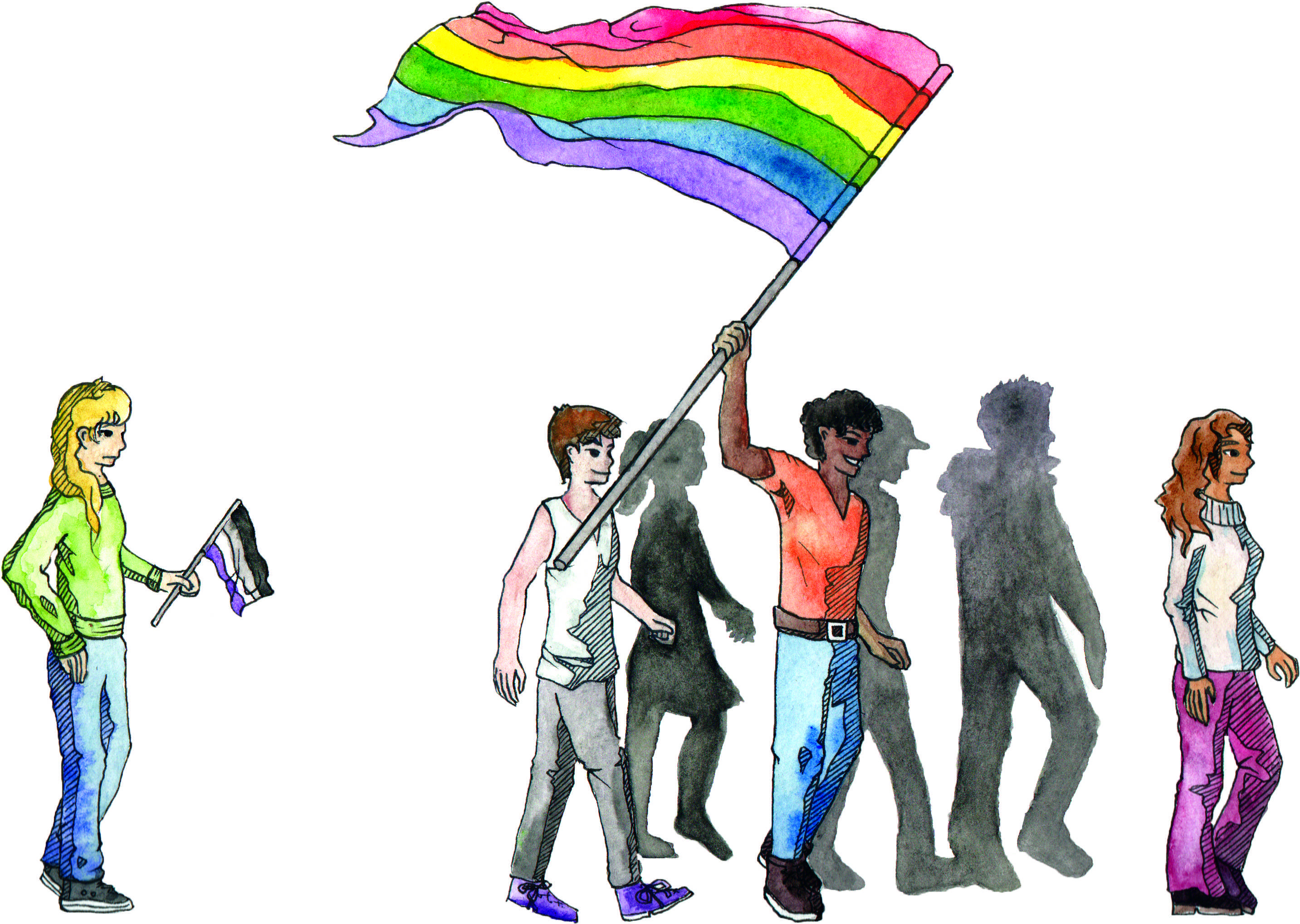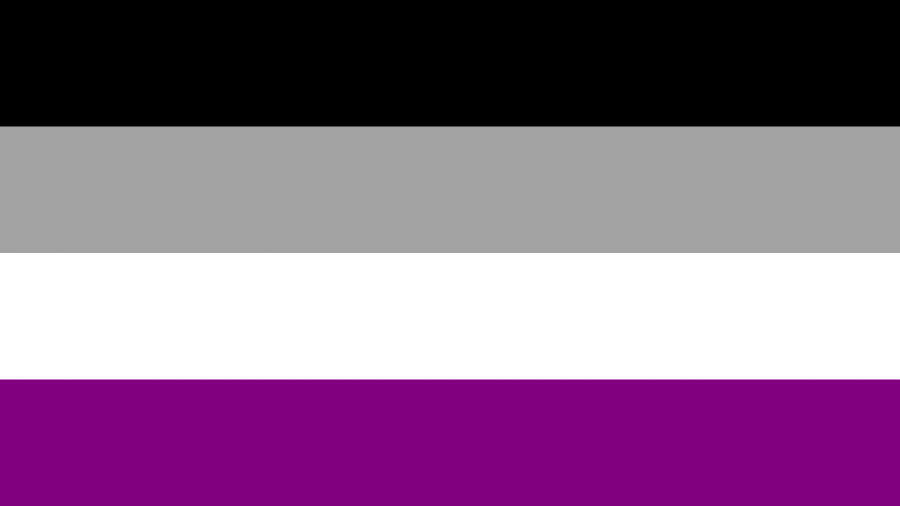
Amber* ’16 has always felt as though she was missing out on the “normal sexual discoveries” that her friends talked about in their conversations. Whenever her friends fawned over a “hot new celebrity,” she pretended to do so as well but never felt the kind of attraction that her friends described. It was only after she saw an article on asexuality last year that she felt she had a way to perfectly describe the lack of sexual attraction she felt towards people of all genders.
Planned Parenthood defines asexuality as “having no desire for sex with a partner.” However, identifying as asexual does not preclude a person from frequently masturbate and have sex with their romantic partners. In addition, their sexual orientation is often separate from their romantic orientation. According to the University of North Carolina student affairs website, “sexual identities and romantic orientations are not linked and therefore a person could be asexual, aromantic, neither, or both asexual and aromantic.”
Amber identifies as a biromantic asexual, meaning that she is not attracted to any gender sexually but is romantically attracted to males and females. She said that although her sexual orientation has not prevented her from getting into relationships, it is frequently the cause of her getting out of them.
“I was dating a guy for a couple of months before I told him I identified as a biromantic asexual,” Amber said. “At first he seemed to be accepting, but after a few months passed and our relationship progressed to the point where we would have been ready to have sex, he became very aloof and difficult to talk to. He stopped talking to me one day, and a week after that we broke up.”
Amber suspects that the reason for his sudden detachment was because he found it difficult to be with someone who was not sexually attracted to him.
“Other than the lack of sexual attraction on my part, I think our relationship was fine,” Amber said. “People are very dependent on the feeling of being needed, so I think that he couldn’t handle the idea that I was not sexually attracted to him. I guess having an asexual partner was a blow to his self-esteem.”
Ceil* ’17, who identifies as asexual, feels as though there is a lack of acceptance on campus of asexuality as a legitimate sexual orientation. He has encountered many instances in which the people he chooses to tell think that he is joking or that such a sexuality is impossible.
“I’ve received so much doubt from others as to the validity of my sexual orientation,” Ceil said. “While other sexualities are readily accepted by the students and teachers here, asexuality seems to be the exception.”
Ceil has received incredulous comments from most of the people he has told.
“It’s funny because they actually try to tell me that I’m wrong about my sexuality,” Ceil said. “One person told me, ‘It’s probably just because you haven’t found the right person yet.’ This person is known among our friends for being very accepting and understanding, so I felt comfortable telling him. I was very disappointed and hurt by his response.”
Because of the comments he receives, Ceil said that he has begun to severely limit how open he is about his sexuality.
“At first, I was okay with telling people about my sexuality, or lack of one,” Ceil said. “But when I started to be more open about it, more people started to tell me that it was impossible to not be sexually attracted to someone. It’s disheartening, especially because some of the people that reject me are part of the LGBTQ community themselves. I know that the community at large is beginning to recognize asexuality as a legitimate sexuality, but I don’t feel like that attempt at understanding has influenced our school community yet.”
Tamar Springer, a Los Angeles based psychotherapist, believes that asexuality is under recognized in general, which causes asexual high school students to be reluctant in revealing their sexuality.
“It is likely that high school students have not ever heard the term or become familiar with what this is and how this manifests in asexual individuals,” Springer said. “Asexual high school students may be reluctant to be open about their sexuality in that it is not altogether common, and feeling ‘different’ in any way is a source of stress for high school students. So yes, they are less likely to be open or speak about their orientation.”
Some asexual students at Harvard-Westlake have a positive experience when interacting with their peers. Ruby* ’17, who identifies as a panromantic asexual, meaning that she is not attracted to any gender sexually but is romantically attracted to all people, feels safe coming out to her friends.
“I feel that at Harvard-Westlake, most of the community would be accepting of the LGBT+ community, since going around on campus, I don’t usually hear too many homophobic or transphobic slurs or discrimination,” Ruby said. “When I do, it’s usually only because the majority of the community isn’t aware that there are, in fact, many LGBT people on campus. So, I feel that asexuality is welcome on campus, but not completely accepted. Personally, I feel comfortable coming out to anyone who asks, but if the subject of my sexuality doesn’t come up, I don’t feel the need to put it out there.”
She also feels that the groups on campus to support LGBTQ+ students are safe spaces for students of any sexuality.
“We actually have really excellent and welcoming groups at Harvard-Westlake for queer students,” Ruby said. “GSA, for example, has incredibly supportive faculty and students running it, and I think that the goal of creating safe spaces for LGBT+ students on campus has definitely been met. Whenever I show up to a club for queer students, I always feel ten times more comfortable being myself that usual, and I can actually feel that being asexual is completely normal.”
Sue W. Goldstein is a American Association of Sexuality Educators, Counselors and Therapists certified sexuality educator. She believes that it is only natural for high school students to be skeptical about asexuality as a sexual orientation, but asserts that it should be accepted as legitimate.
“I don’t think asexuality has been accepted as a legitimate sexual orientation by most adults, let alone high school students,” Goldstein said. “If someone has no feelings of sexuality and they were fine like that, then they are asexual and that is fine. Is it a sexual orientation? As each individual has a right to their own self expression, self image, self being, whatever you want to call it, then in essence a lack of a specific sexual orientation must be considered a sexual orientation for lack of a better category.”
She understands that being open about one’s sexuality is difficult but applauds students for their steps towards understanding.
“Coming out as anything other than the norm while in high school is always going to be hard because of peer pressure,” Goldstein said. “As each generation becomes more aware and more educated around different sexual orientations and sexual identities, I think there will be less stigma about being ‘different,’ which is how anything other than straight and sexual is still so often perceived. No matter what sexual orientation or lack thereof, you are who you are, you are what you make of yourself, you are what you do, you are your values and your friends and your accomplishments, and none of that should change no matter whether you are sexually attracted to girls or boys or both or neither.”
Goldstein believes that there is no significant difference in accepting asexuality as a sexuality versus accepting homosexuality as a sexuality.
“When my son came out as gay, someone asked my how I felt about him,” Goldstein said. “I said he was the same boy after he told me as before, so why would my feelings about him change? It should be the same for someone who is asexual—they are the same person no matter what.”
Claret* ’18 agrees with Ceil in that while she believes the Harvard-Westlake community is accepting of the LGBTQ+ community as a whole, asexual students seem to be an exception.
“I’ve never had the courage to tell even my best friends at Harvard-Westlake of my sexual orientation,” Claret said. “When I ‘tested the waters’ and made a comment about asexuality to my friends, they seemed to completely dismiss the topic altogether. It makes me sad, especially because part of the reason I chose to come to Harvard-Westlake was because of its acceptance of the LGBTQ community. But I try to find happiness in seeing others who are part of the community being accepted for who they are.”
Claret says that she was discriminated against at her old school for being asexual, which contributes to the reason why she has yet to come out to her friends.
“At my previous school, I was badly bullied for coming out as asexual,” Claret said. “Both girls and boys would throw condoms at me during the lunch break or make kissing faces at me. One time, I opened my backpack, only to find that someone had poured lube all over my books. Everyone was scared to be friends with me because they were scared that they would receive the same treatment just for associating with me. I don’t blame them. If I were them, I wouldn’t have wanted to be friends with me either.”
Garnet* ’16, who identifies as heterosexual, said he feels guilty for something he said to an asexual friend at his old school.
“It was before I realized how sexuality really is on a spectrum,” Garnet said. “But I still feel terrible about one instance where I laughed in the face of a friend who had the courage to tell me that he was asexual. I joked about how not feeling sexually attracted to someone was impossible. I even went as far as to say that he just needed to date more. Now that I’m older, I know that asexuality is a legitimate sexuality and that sexuality is self-determined. If I could go back in time and change what I said to that friend, I would.”
Coral* ’16, who is a student leader of the Gay Straight Alliance club, says that the club is making efforts to increase the acceptance of asexual students.
“We’ve had discussions this year in Project 10 and GSA about asexuality, attempting to raise awareness in general and talking to asexual students about how to make them feel more comfortable,” Coral said. “Recently, we’ve actually also been planning a GSA meeting focused on asexual and aromantic students about the lack of awareness on campus, as there are a lot of misconceptions even within the LGBTQ+ community.”
Goldstein urges students to accept all sexualities as self-identified and to be aware of their words, as they can be hurtful without realizing.
“We hurt others so easily with words we say without thinking,” Goldstein said. “Our parents taught us if you don’t have something nice to say, don’t say it. It shouldn’t matter what sexual orientation anyone is except within a couple who are dating, so lets respect all people and allow them the opportunity to live their lives as they are. Sexual orientation is not a choice but a biologic predetermination.”
*Names have been changed





































